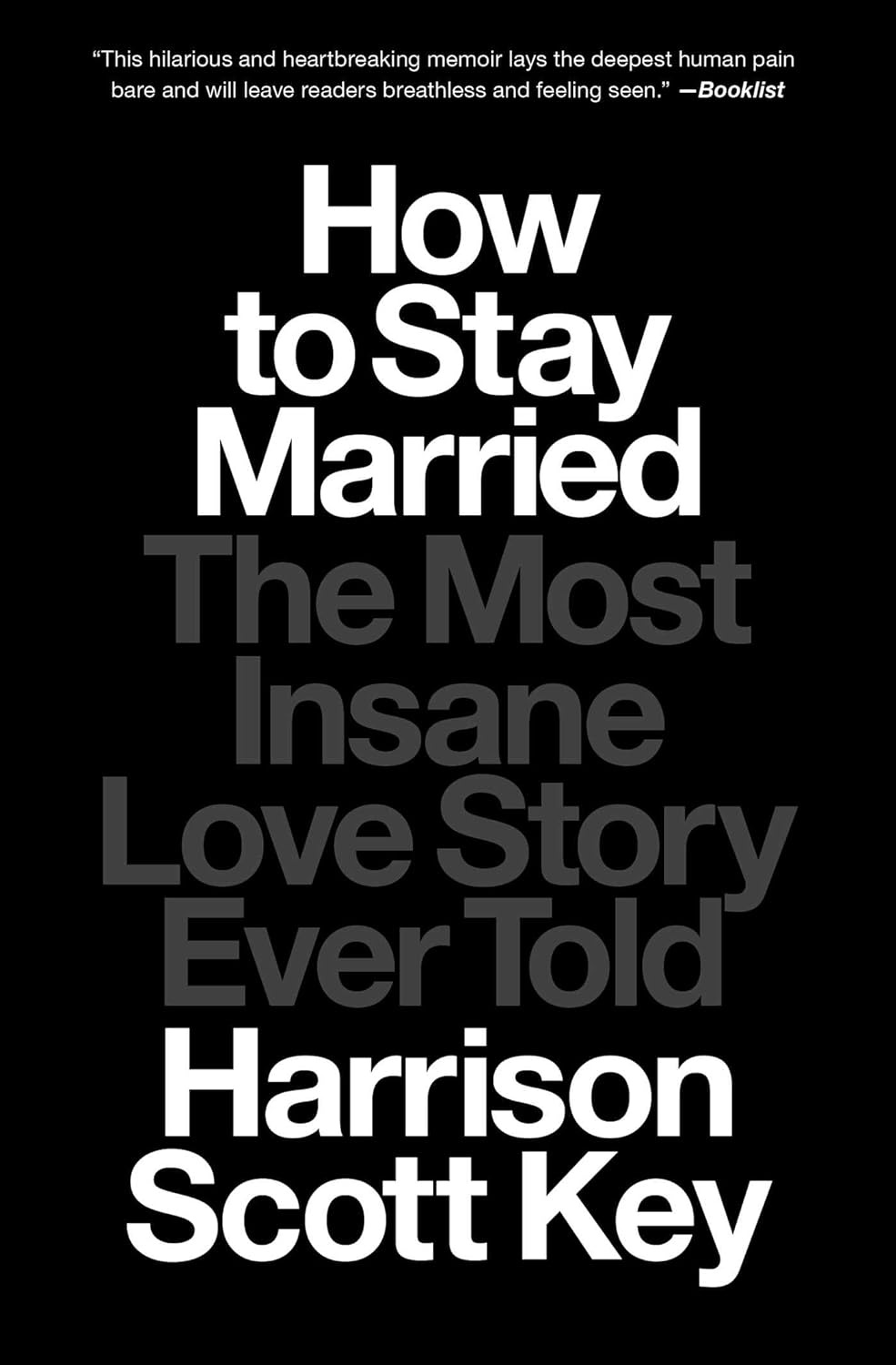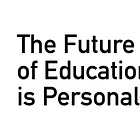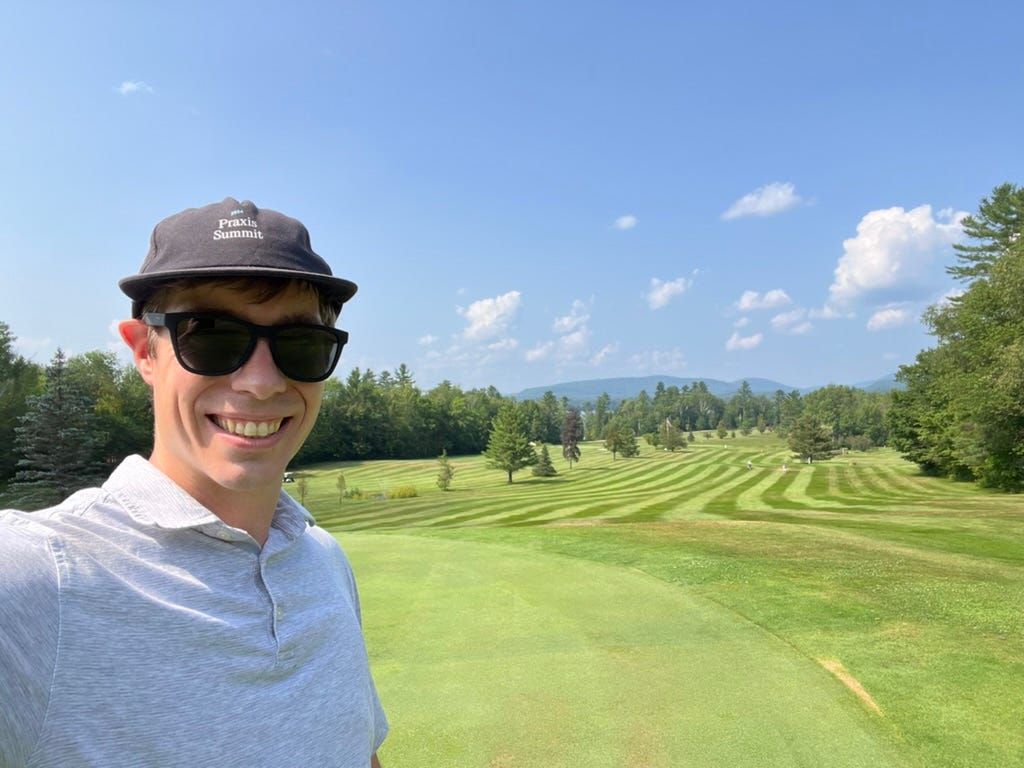No Struggle, No Progress. Know Struggle, Know Progress.
A conversation with LeTourneau University President Steven D. Mason
Earlier this Spring I had the chance to talk with Dr. Steven D. Mason, who currently serves as the President of my undergraduate alma mater, LeTourneau University. The transcript of our conversation was recently published in the Spring/Summer 2024 issue of LeTourneau's NOW Magazine. You can read the original interview on page 50 of the digital version, but I wanted to share the conversation here as well. The text of the interview is unchanged except for a few minor edits for clarity and the addition of several hyperlinks to allow you to more easily chase down some of the references.
We had a great and wide-ranging conversation about what was influential on my path to and through LeTourneau, the prototyping mindset, artificial intelligence, the value of struggle, and approaching technology with wisdom. I hope that you enjoy it! A link to the recorded interview on Spotify is below and available on other podcast platforms as well.
The Path To and Through LeTourneau
Dr. Steven D. Mason: I have really enjoyed staying current, Josh, on a number of things by keeping up with your writing and have found it tremendously helpful in getting a good solid perspective on this crazy world of advancing technology. We could devote a conversation to any one of the topics in your weekly Substack newsletters, but for starters, will you tell our audience a little bit about where you're from and how you ended up at LeTourneau?
Dr. Josh Brake: I grew up in Connecticut, about an hour outside New York City. My initial connection with LeTourneau was through my dad. He went to LeTourneau back in the 80s. So, when I was looking at colleges coming through high school and was starting to think about where I wanted to spend those really formational years, and was looking at engineering as a major, LeTourneau was already on the list. When I visited campus, I really felt that LeTourneau was where God had me in that next season, and I felt a real peace about that. Now, almost a decade after graduation, I’ve seen the way that God has used the seeds He planted during my time at LeTourneau in really rich ways that I'm so grateful to be able to steward.
Mason: We recently featured you in our NOW magazine, which goes out to thousands of people, our own alums, but others as well, friends of the University. And in that article, you gave us a little snapshot of your time here at LeTourneau and what that was like for you. I loved it. If you would share just a bit about how did LeTourneau shape you, now as a professor but also, more broadly, as a person.
Brake: I think it's hard to overstate the influence that my time at LeTourneau had on me both as a person and even more as a professor. In that piece, I wrote a lot about the impact that [LETU Engineering Professor Emeritus] Dr. Bill Graff had on me. There really is no way to put it into words. The thing I keep thinking about as a professor, every day I come into work, is people—above all else. And that's something that Dr. Graff really put at the heart of who he was, in all the different ways; something that really shaped my way of thinking. And I think, even more broadly than that, the thing I learned most at LeTourneau was that education primarily needs to be about relationship. That's the most impactful thing. When you talk to people about what the most influential piece of their education or upbringing is, they very rarely talk about a specific class or a specific thing they learned. Even if they talk about a class, it's not really about the class and the course material as much as it's about the person who is teaching them. That has shaped a lot of how I think about the way that I'm looking to live my career as an educator, as a professor, is to be about people before everything else. It's not that those other things aren't important, but the big thing is recognizing that these people that we have in our classes and that we work alongside and that are teaching us—those relationships are really what matter most.
Mason: I can only imagine the impact that you're having at Harvey Mudd because of that. The famous Maya Angelou quote comes to mind: “At the end of the day, people won't remember what you said or did; they will remember how you made them feel.” I’ve seen that bear out when I think about my own mentors and how they inspire me to be a certain kind of person and to make a certain kind of impact on the world. Just by reading what you write on a regular basis, I can tell that's the way that you care for your students—on top of caring intensely about the course content, which is obviously part of a prerequisite of being a great professor. I'm sure you're making the kind of impact that Dr. Graff has made on generations of people here at LeTourneau.
There are so many things that we could dive into, Josh. I want to read, for our audience's sake, the little short paragraph that you put in your weekly Substack newsletter, The Absent-Minded Professor, that sort of describes what you're after: “This newsletter is my weekly outlet for manifestos on technology, education, and human flourishing through the lens of a prototyping mindset. I believe that with a little bit of curiosity and the right systems of iterative improvement, we can live more fully and help our neighbor to do the same.” What do you mean by prototyping mindset?
The Prototyping Mindset
Brake: The idea of a prototyping mindset is really inspired by the Stanford Life Design Lab, which was started by William Burnett and David J. Evans. The kind of idea that they take there, in a very Stanford-esque way, is to say, ‘what if we take the engineering design process, which we typically think about as these five steps of designing new technology or engineering solutions—where we first empathize with the user, understand what their problems are, then we define those problems, ideate solutions, prototype those and test them’—and ‘what if actually we took that kind of mindset and framework and thought about it outside of the traditional realm of engineering as a field and actually applied these more broadly to our life?’

That really resonated with me as an engineer. That's something that I see and use all the time in my technical work. But I think it's true of people in a lot of different fields, whether it's a professor or somebody working in industry and tech, or a filmmaker. These kind of things really translate across different areas. For example, comedians are always prototyping. Every time they go out, they tell the joke in a slightly different way. And then they're taking notes. They're doing these kind of design processes. Anybody who's telling a story or, you know, founders of companies—entrepreneurs are famous for this type of thing—are always tweaking things a little bit: ‘Let's test it. Let's try something new. Let's see how this lands.’
And what I think is really important about that perspective is that it's really focused on the audience and communication: ‘how are we adapting what we're thinking about to resonate with an audience and form a connection about this relationship piece?’ So, the prototyping mindset is really just this way of me trying to think about approaching the problems that we face in our lives, or the things that we aspire to, in a framework that allows us to get traction. The idea is just to start with a small prototype and then iterate, build on that, and really embrace failure as a prerequisite for eventually succeeding. The kind of analogy or the mental image that I keep in my mind is this: you’ve probably been to these parking garages with the spiral ramps. And if you look at that from top down, it looks like you're going in circles. But then if you look at it from a three-dimensional perspective, you see that going in circles is actually going up. You're iterating and improving. That's what I see when I think about the design cycle. It’s not just this two-dimensional thing going on. It's a three-dimensional process that if you do it right, you can keep moving, keep moving toward your goal.
Mason: You write a lot about how engineering education is about more than producing a sort of technical skill. You’ve talked about ‘learning how to learn,’ about producing curiosity and wisdom. You’ve mentioned how there's a relational nature of education in places like Harvey Mudd and LeTourneau. You bring to bear the relational nature of technology, or what technology is trying to do at its best. Would you say a little bit more about how to balance technical skills with some of those, let's call them, ‘higher order aims,’ even in the classroom?
Brake: I think a perfect place to start on this is what I tell the engineering sophomores in the experimental engineering course that I teach along with four of my colleagues. It’s this cool team talk class where they do these experiments with underwater robots, and it's pretty amazing to see the way that this course really shapes them. What I tell them is this: “you come into this class as a student studying engineering. But we want you to leave this class thinking of yourself as a budding engineer.”
And so from that perspective, there's really two buckets that I think about when it comes to that. One is the technical skills piece. You have to know how to do the thing, right? You have to know how to design an experiment, how to design the instrumentation, how to capture the data, analyze it, and understand what's going on. But then there's this other piece of it, that I think we often lose sight of in the technical sciences, or when we're thinking about the hard sciences. And that is this: who you are and what you bring to the table as a person doing this thing really matters. So, the other big learning outcome that we explicitly talk about in that class is about identity formation. This is about helping you to become an engineer and all these other aspects that play into that: ‘Who are you as a person? What are your core values? What's your mission and vision? What does the good life look like to you? What do you care about in the world? What are the things that you want to have an influence on? And then, how do you work? How do you work on a team? How do you embrace failure?’
All of these pieces are really the nutrients that surround the technical work that we're doing and that our students will be doing in the future. How do we actually think of ourselves [as institutions of higher learning] as less of an assembly line, Henry Ford style, turning out new graduates? Like stamping them with some kind of stamp. What's actually happening is much more like gardening, or cultivating, or pruning—creating the right soil, the best blends for that plant to really flourish and grow. It’s the perspective to know that every student that comes out of our programs is not some widget, in a kind of engineering sense, but is a person and unique in the way that they approach the world. That actually is a huge strength that we want to draw out and really embrace in our students.
Mason: I love that. That is so well put. It’s sort of embodying a call, rather than just trying to get something done. And it's so holistic. It's who we are. And one thing I've learned at being at LeTourneau now, at the close of my 18th year, is that there is a culture where students say, ‘I am an engineer; I’m not just studying engineering.’ We are trying to help our students think about what they do as part of who they are and not separate from that. In the same way, in my field, biblical studies, some might consider us, let's say, professional theologians. But everyone is a theologian. Everyone has some perspective on God or a higher power and what He's doing in the world—what problems our faith might be trying to solve, what the end or goal of humanity or all of creation is. We all bring that to bear, and it's probably better for us all to think about ourselves in one form or another as a theologian. But I love the way that you're relating this concept to such a technical area. Engineering involves analytics and mathematics and physics, and so many other elements, but there is something that animates it all. And there's something important to us as people, as human beings made in the image of God, that means it's more than just ‘doing engineering.’ The relational nature of education, but also just practicing your giftedness, is crucial for what's become a sort of buzzword phrase: human flourishing.
Brake: I kind of see this as another instance of this one-pot system idea that Dr. Graff was so adamant about. We humans always say, ‘Okay, let's compartmentalize this thing.’ And ‘what I do as an engineer over here is separate from what I do as a human, or what I do as a Christian on Sunday,’ or what have you. And I think that fundamentally that's such a limited way to see the world. I think it also is at the root of a lot of the things that we're starting to see when it comes to, let's say, Artificial Intelligence, or technology at large in our culture. We have this way of thinking that ‘we're just developing technology,’ as if this doesn't have anything to do with the broader picture of what the good life looks like and what we think that is. When, actually, it's very, very deeply grounded in a vision of what we think human flourishing looks like and what the vision is we have of the world. So, to try to reintegrate those things is a constant battle and struggle, because it's just natural for us as humans to try to disentangle and separate things. But it's really important for us, if we're going to design technology that's actually going to help humans, to be always thinking about how that connects with not only our own personal identity and who we are, who we bring to the table—but how it affects our neighbors, too.
How Should We Think about Artificial Intelligence?
Mason: Artificial Intelligence is, of course, so profound and pervasive in our world as a whole. I'm really curious to get some of your latest thoughts, because it's developing and growing and advancing in all sorts of ways. I know you've been thinking about A.I. in large language models and their use and their impact on our society. Obviously higher education in general is wrestling with how to wrap it’s arms around A.I.—wondering ‘how are we going to harness, if you will, A.I. for the sake of education?’ What do you think the near future holds for us in this way? Do you see A.I. as an important element of higher education?
Brake: It's so interesting to me that some of the best stuff I've read about A.I. was written forty years ago. It’s interesting that we think this is new, and in some ways it is. There are aspects of A.I. that are new, but one of the best things I've read in this vein is this series of lectures by a Canadian physicist, Ursula Franklin, a Canadian metallurgist, research physicist, author, and educator who taught at the University of Toronto for more than 40 years. She gave these 1989 CBC lectures called “The Real World of Technology.” She highlights a couple of different things that are really important and that really resonated with me. One of them is that technology is never created in a vacuum.
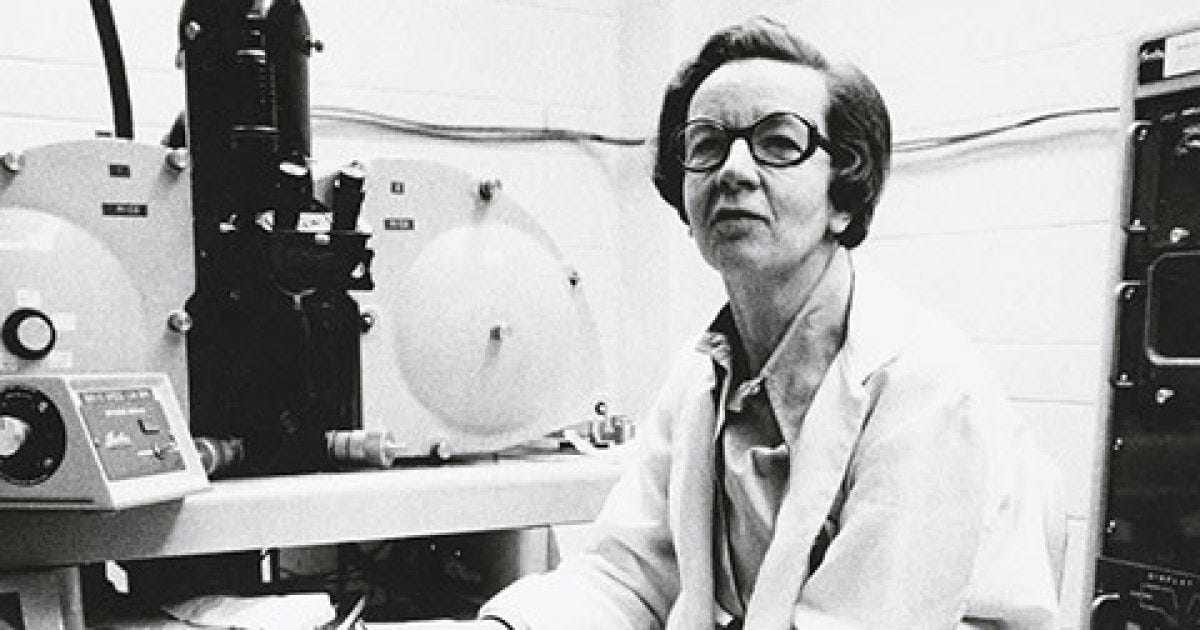
Whenever you create something, it's in the ecosystem. There's always this ecosystem. So you introduce A.I. into a classroom, and it doesn't just change the classroom in some very predictable way. There are all of these intersecting pieces that get put into this feedback loop of how the culture is set in the ecosystem. And it's very hard to predict all of the different potential avenues for the way that that actually will work itself out. The other thing that I thought was really prescient when she's talking about the impact of technology more broadly is that we often think about technology in the situation where a single user uses it or a small group of users use it. We don't think about it more broadly when it reaches mass adoption.
It’s one thing to think about how the car impacts your ability to go somewhere. It's a whole other can of worms to think about how everyone having a car, and roads all over the place, impact and shape our society. Part of the challenge, I think, with technologists at large, is that we're not very intentional about thinking down the line and trying to see where in history we've seen these types of things happen, and trying to draw the parallels. Then, we must try to imagine how this technology plays out. How does this influence us when it's not just the teacher using A.I. or a single student using A.I. to help them with something? How is this impacting the culture of the classroom when all the students are using A.I.? What does that actually do to the relational fabric of the classroom and of an educational institution?
I'm not anti-technology. Obviously, I'm an engineer and I love technology. But at the same time, we often really don't think about the way that technology impacts us beyond just the positive aspects. Take medical interventions, for example. If you watch an ad in the Super Bowl for the latest drug, all these side effects that get listed that the regulatory agencies essentially make them include. But we don't do that when we think about new apps, like Instagram. It's going to connect you to all your friends and you're going to see all these pictures of what's going on. And oh, by the way, you're going to become addicted to dopamine hits and just need to scroll, scroll, scroll, scroll, scroll and feel this loneliness and all these other deep things. We don't have really good, healthy ways of talking about that. That's another thing I think, as an engineer, that we need to factor those dynamics into the way that we think about technology as we're building the technical aspects of it. All these other aspects need to be built alongside that, not just as some kind of after-effect, to do no harm with this thing after you make it. It's much more complicated than that.
Mason: What a balance to strike. You talk about the delightful uses of technology. And, you know, there is something maybe even godly, so to speak, of pressing into the potential of humanity and creation, and where the two meet. And yet there are threats, if you will. We’ve started to see real fears of what technology can do unmitigated and mentions of the A.I. apocalypse, which is really fascinating.
Some of the same people that are developing the technology and are pushing the limits are also the ones saying we need to have some real guidelines on emerging technology. And of course, the question is always, even if I'm sort of behind that in principle, ‘who says what is good, right and beautiful?’
What are your thoughts on the threat that technology might control us, rather than humanity controlling technology? How do we know if technology is inadvertently doing more of the dictating than the other way around?
Brake: Part of the challenge with this whole thing is that it plays on, I think, our natural human impulse to see the positives and downplay the negatives. We do that in the marketing of these technologies, the design of these technologies, and the use of these technologies. It's very easy for us to think about all of the great things that our phones and computers and all of the other devices around us enable for us. But there's some real downsides to that. I think part of the problem is that we don't really see or think about those things unless we can somehow disconnect ourselves and separate ourselves from the technology in a way, because part of the deception of the technology is to say that you require it.
It becomes such a part of our natural rhythm of life that we just can't even imagine what it is to live without it. What would it be like to live without our phones or even go on a walk without our phones? Heaven forbid, right? Like somebody needs us. It’s these lies that we tell ourselves. The companies and the developers are not off the hook for this. They're certainly all about engaging you and trying to grab your attention. There's so much of this that's tied up into the economic and political and historical aspects of how these technologies were designed and developed, and the fact that all these social media companies know that the way that they make money is by keeping you engaged. But the ultimate irony is that the question is not whether you're engaged. It's ‘what are you engaged in?’ And ‘is that thing actually useful? Is that valuable to you? Does that actually help to cultivate the things that you want to be as a person?’
I think if we take some time to separate and really answer that question for ourselves, we'll find out that the answer is ‘no, not really.’ We're so often actually in service to someone else's agenda. And these things are not really aligned with what we want or what we need—with what our vision of the good life is. We've got to find a way to think through that. Finding the middle path between optimism and pessimism around technology is to really try to get at the heart of things: ‘What's the thesis statement of these technologies? What's the purpose? What is the vision of life that this technology says is good?’
These are things we don't often talk about as engineers. We often just consider: ‘here's a problem; let's solve it.’ We make this thing easier, or more efficient, or faster—or make more in less time. And that essentially is what we view as the ultimate good. But efficiency and productivity are not fundamental human values. Whether you do something faster is not actually important. It's about whether or not it’s valuable to do in the first place. And then, maybe, there's value in doing it faster or more efficiently. But those are not the things that are going to lead to lasting flourishing and joy for us as humans. We've been deceived in many ways. And we've deceived ourselves, unfortunately, in many of these ways that we think about technology. I think we need to find some better ways to think about it, both as designers and as users.
The Place for Productive Struggle
Mason: One topic that stuck out to me in a number of places in your writing is the idea of struggle. So much of our life, it seems, in our modern world is trying to eliminate struggle. There's something, I guess, natural about that. We don't like to be sidetracked or delayed or set back. And you talk about the difference between pain and struggle, which I thought was so well put. I'd actually never thought of that, but there is quite a distinction there to be made. For example, A.I. is one way to avoid the struggle. Not long ago, if you didn’t know what a word meant, you had to go to the dictionary and actually look it up. Now, we can all Google something and just get the definition. Something may be lost there. Do you ever think about the same process as an educator in terms of struggle and what role struggling plays in learning?
Brake: It's so important and it's so interesting to think about pain versus struggle because struggle has this very negative connotation for us, I think. We think that struggle is bad, almost in the same way that we think of friction being bad in an engineering situation. Friction or resistive losses, like losing energy to heat or reducing the amount of energy that we can deliver to the output, is viewed as waste. In some cases that's certainly true. Friction is not getting us anything productive.
But, if you're going to go into the weight room and try to get stronger, you have to struggle. If you go in there and don't push yourself at all, you're not going to grow. The way our bodies work physically is to experience a stress and then recover from that stress and then recovering from that stress, we become stronger.
I think there's something really true there about learning, too, that if we just see the same information, or we just encounter the same concepts over and over again, we're not pushing ourselves outside of our comfort zone. If we don't do that, we're not going to learn. We're not going to grow.
At the heart of it is this fear of failure. This is big, especially for students and engineers—or really for anybody. We're really scared of failing. And we really have these unhealthy ways of thinking about struggle or failure. If you look at the people who are the most successful, the number one thing that you could correlate with their success is the number of times they fail. This gets back to the whole prototyping mindset. Scott Witthoft, an author and former Stanford professor, talks about prototyping as embodied questions. The idea is when you prototype something you are trying to answer a question, and you're embodying that in some form or fashion. When you view it in that perspective, the goal of every prototype is to fail. But in the failing, you learn something, and then you iterate from that and you improve on that. That really connects this idea of friction with learning and education.
What I try to tell my students, and remind myself, too, is that in the ways that we're learning, we have to be embracing failure. It's not even enough just to say, ‘Ah, we'll tolerate it.’ Failure is a very positive thing if we do it in the right way, and if we're learning something from it. It means that we're actually pushing ourselves beyond our limits, of where we kind of see the extents of our knowledge and understanding in our skill. I think of myself, as an educator, more and more like a coach in a lot of scenarios—where my goal is to help you to understand how to unlock your potential and encourage you to push beyond that.
In the same way if you're lifting some heavy weights in the gym, you're going to want a spotter there to be able to help you if you are not able to make the lift and not have the bar on your chest, right? If you're trying to bench press too much, you have a spotter there. You have a coach. You have somebody who's walking alongside you in community, in relationship, to actually encourage you to push yourself and then to be there to help you, when inevitably you're going to fail. And if you're not pushing yourself to failure, you're not going to grow to your fullest potential. There's a real tension there, but I think it holds a lesson I want students to understand—and for all of us to understand, really—is that failure is not the enemy here. Failing poorly is the enemy. Friction is not always the enemy, either. We have to embrace the struggle.
Mason: Phil Burks, who’s become a really good friend of mine (he's a trustee, a graduate of LeTourneau, and a successful entrepreneur) has written a book called "How to Eat a Failure Sandwich." And it's to that very point, about the struggles along the way that have helped him become who he is and do some really amazing things over his career. Our current generation sometimes gets a bad rap for a lack of resilience, or lack of grit. That probably goes for almost anyone now, no matter their age or generation. And I've wondered: ‘How does technology impede our resilience and grit by providing the quick fix, entertainment, distraction, or escape? How has that impacted our ability to struggle, and to struggle well?’
Brake: Andy Crouch, whom you’ve interviewed before, authored a book before this generative A.I. stuff really hit the fan that talked about the life that we’re looking for—about asking ourselves, ‘what are the things that we actually care about?’ This idea of technology promising superpower really resonates with me. I just read a great piece by MIT’s Ford Professor of Economics, Dr. David Autor, recently, and one of the things that he sets forward is the idea of technology in an augmentation versus automation frame—or rather, whether technology is extending the abilities we already bring to the table as humans, or whether it is somehow replacing us.
And now, we’re back to the struggle. It's uncomfortable to struggle, whether we're climbing a mountain or working at a work gym or running. Whenever we push ourselves a little bit beyond our limits or push ourselves to the limit, we feel that discomfort. And the allure of technology is to say, ‘don't worry, you don't have to struggle anymore.’ ‘There will be abundance.’ ‘We'll automate these things that you don't like to do.’ It’s not to say that automation is bad in all situations. And yet, we have to be really careful there. It’s not necessarily just about the work and the way that we're doing it, but actually the way that it is forming our view of what it means to work and to live a full life.
Approaching Technology with Wisdom
Mason: As professors at universities like LeTourneau or Harvey Mudd, we get to engage with really bright people who are looking for jobs where they'll be paid for using their gifts to build or to sustain technology. How do you help them understand the tension between the positive value of technology and the dangers that come with applying technology in certain ways? What are some tips or pieces of wisdom that you give them as they go out and want to make a difference in the right ways?
Brake: I think the first thing is just to encourage them to bring a curious questioning lens to all of these problems. My hope is that as we continue to have these conversations and these questions get more embedded into our context, that we start to think differently. I think the first thing is to pay attention to the language of the stories that are being told. For example, what's the narrative that Apple tells you about the new Apple Vision Pro? I got to try it for the first time first last weekend. It's an amazing piece of technology. I mean, in terms of the fidelity of this thing, it is just unbelievable how crisp and clear it is. The optical engineer in me is amazed at what we can do now. But then what does this do to us as humans? What does it say about what our vision of the good life? We literally are going to pay $3,500 to put blinders over our eyes and see our entire world mediated through cameras and overlaid with apps and screens and whatever else. It's a whole different vision of what reality is. And the language here is really, really important as we even talk about augmented reality or mixed reality. There's a lot of freight being carried there that we're just not paying attention to. It's very easy to just drink the Kool-Aid without even realizing you're drinking the Kool-Aid. And again, this is not to say that I'm anti-technology, but back to Andy Crouch. He's just such an insightful thinker on these ideas, including the prompt: ‘Are we using our technology for a very specific purpose in the way that we would use a scientific instrument or a musical instrument? Are we using it in a way that actually and deeply extends our humanity? Or are we outsourcing our abilities and our lives to devices to allow them to control and influence and put us in a certain direction?’ He calls it the ‘innovation bargain.’ Of course, there are trade-offs to advancing technology, and we more quickly recognize the benefits.
Mason: At LeTourneau, we talk a lot about the question, 'just because you can build it, should you?' Or to put it in Paul's language, not everything that is permissible is beneficial. Is there anything that you might offer when it comes to that question?
Brake: Silicon Valley comes to mind. I think that this is the idolatrous vision of artificial general intelligence. So the idea about artificial general intelligence or A.G.I. is really the end goal of a lot of these A.I. startups right now. The idea is not to use artificial intelligence as a tool or an instrument, but to essentially create a machine that has what they would try to say is human level intelligence, whatever exactly that means. And whether or not you think this is possible or not is one question, but I think it really is a great question for us to be asking, 'Okay, let's say just for argument's sake that we can build this. Should we build this?' And I think fundamentally I can't help but see the parallels between the Golden Calf and the story of Exodus, which is to say, "Everybody come and bring all of your riches and let's build this thing and make it our god.” To essentially worship it in a way that says, "We're putting the created in the place of the Creator."
One of the things that has been most exciting to me in the conversations I've had over the last year or so about A.I. is it brings so many of these questions—about what it means to be human and what we're all trying to do here to begin with—to the forefront in ways that other technologies don't do as clearly. It's not as clear to consider your phone and say, "Well, what does this mean for me, for a human? How is it shaping me?" But when we talk about artificial general intelligence, it's right there. We are literally trying to create a machine that is, in some sense, indistinguishable from a human, even beyond what a brain analysis would try to create.
Mason: Can you speak to the role of the liberal arts and humanities and help us imagine or examine what the boundaries might be or how we go about weighing ‘is this the right thing?’ ‘Is this a good thing?’ What might you have to offer and say about the importance of the liberal arts at STEM institutions?
Brake: I have this phrase in my mind: 'History may not repeat itself, but it sure does rhyme.' This kind of idea as engineers that we have A.I. now and deep learning and all these things that are in some sense fundamentally new. On the one hand, there is some truth in that. It is really innovative. There are new things here that have not yet been discovered in the history of humanity. And yet, we can actually learn from history and the way similar things played out. Take the industrial revolutions: steam, electricity, the internet age, and the age of A.I. The nature of a technological evolution is not totally independent from a technical revolution of the past.
It doesn't often take very much technology to really make a significant impact. Think about the impact of something as seemingly trivial as the spur or the stirrup. What simple technology enables is pretty profound.
Mason: What might you say to us here at LeTourneau in terms of wisdom and encouragement in fulfilling our calling?
Brake: Y'all are going to think I'm a broken record by the end of this, but the basic line is that for me, the future of education is personal, not personalized. And what I mean by that is to say that personalization has this mirage of relationship that's associated with it. Your newsfeed is personalized. Your Twitter feed is personalized. What you see on the Internet is personalized for you. It is designed to give you the impression of relationship when there is no relationship there. And so I think as we have artificial intelligence or technologies—whatever is next, even after A.I.—we really need to pay attention to what that says and what we believe life is about. For me, really, the heart of it is that relationships are what are most are influential and meaningful to us as humans. When you are thinking as an educator about the way that you teach students, and for students, the way that you're learning from your mentors and how you're interacting with your peers, how you're interacting with your professors, how you're interacting with the staff that are coming alongside you and helping to support the mission of a university or a learning experience, we really have to think about the value of relationships. That's what we have to cultivate. And what ultimately is going to be the thing that lasts in our in our lives. It really shapes us and makes a difference.
Mason: We're just delighted to be in relationship with you, Josh. We’re so proud of what you're doing and admire the way that you are impacting not only your students, surely, but also all the people that are reading the things that you're sharing. You are encouraging us to think fully about the great goods and services that technology can provide and extend the human endeavor—in all the ways that God would would see fit. And yet, you equally and appropriately caution us about what what guardrails need to exist and what needs to be taken into account as we attempt to live our lives to the glory of God.
The Book Nook
I finally finished How to Stay Married by Harrison Scott Key last week. All I have to say is that the subtitle is accurate. This is an insane story.
The book is funny, heartbreaking, and thought-provoking all in one. If you’re married, want to be married, perhaps one day may want to be married, or even not married with no desire to be (think I’ve covered everyone there), this book is worth a read.
The Professor Is In
In the next few weeks, I’m excited to have the opportunity to run a few workshops with faculty at Harvey Mudd about generative AI and pedagogy. I’m planning to share some of the resources I share at those workshops here in the next week or two, so stay tuned.
The main point I want to emphasize in these workshops is that the best offense or defense against generative AI is good pedagogy. If you’ve been around for a while, you can likely guess some of the main pillars of the case I'll be making.
Leisure Line
Got out for my annual round of golf (yes, that means it is nothing to write home about unless you like big numbers). Hard to beat a few hours on the beautiful Lake Pleasant Golf Course, even if you’re spending a lot of time hunting for your ball on the adjacent fairways.
Still Life
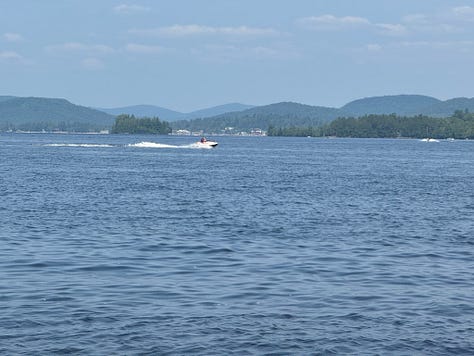
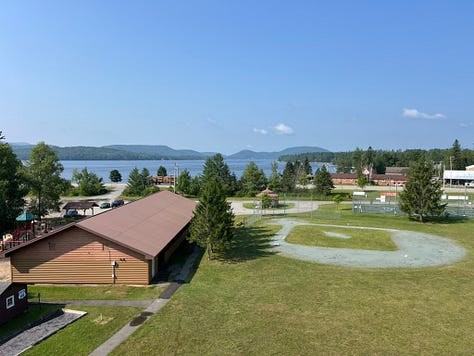
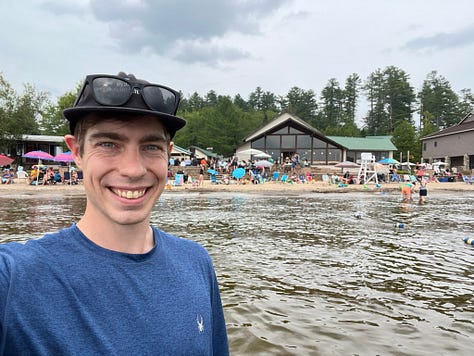
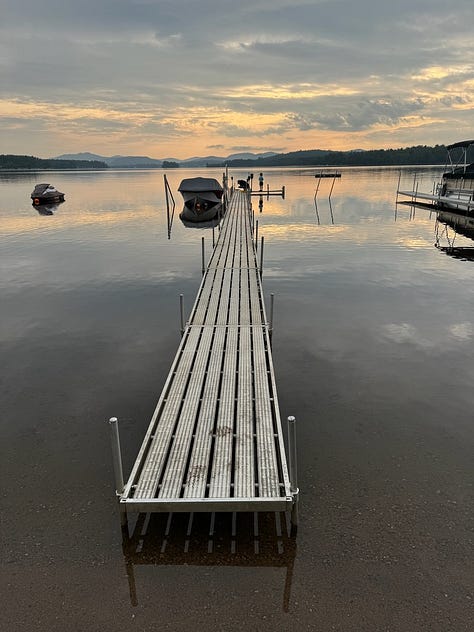



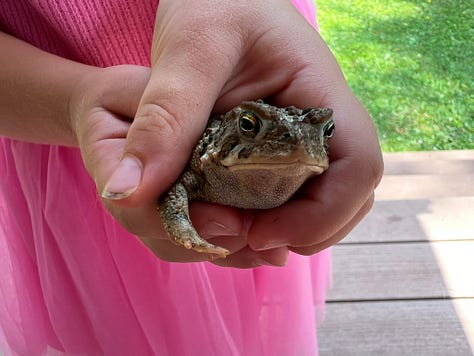

Many fun memories by the lake last week from jetskiing, to donuts, homemade birthday cake, toads, and slugs.



